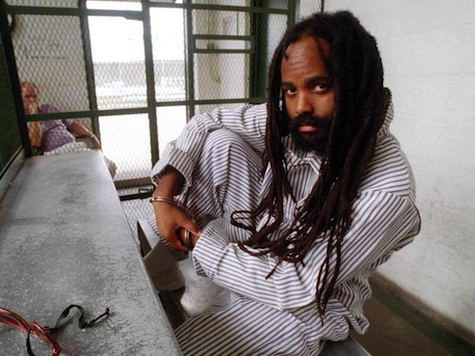“This decision today proves neither my guilt nor my innocence,” Mumia Abu-Jamal told a Philadelphia courtroom 32 years ago this month. “It proves merely that the system is finished. Babylon is falling!! Long live MOVE!! Long live John Africa!”
More than three decades later, Abu-Jamal’s shrinking band of votaries similarly refuses to view the court’s decision, or the rulings of subsequent judges who have unanimously upheld his guilt on appeal, as the final verdict.
The Alameda Labor Council earlier this month labeled Abu-Jamal “an award winning journalist.” They dubbed him a “defender of the rights of the working class, people of color, and oppressed people.” They refuse to call him what a jury of peers called him more than three decades ago: murderer.
“Be it resolved,” states the self-described union of unions, “that the Alameda Labor Council condemns [the Oakland Unified School District’s] censorship of the Urban Dreams website and demands that it immediately restore access to all materials on the website, reaffirms its demand for justice for Mumia Abu Jamal, and issues a press release to seek the widest possible support from defenders of free speech and those who seek justice for Mumia.”
The Oakland AFL-CIO affiliate’s rediscovery of the ’90s cause celebre stems from the Oakland Unified School District’s decision to scrap a curriculum that compared the assassin Abu-Jamal with the assassinated Martin Luther King. The latter famously said, “Nonviolence is a powerful and just weapon.” The former infamously said, “I shot the mother—er and I hope the motherf—er dies.”
City University of New York professor Johanna Fernandez told Megyn Kelly on Fox Tuesday night that “the facts of this case haven’t come to light.” But the facts that came to light at trial convinced a jury selected by Abu-Jamal that he shot a Philadelphia police officer in the back and then the face in the early hours of December 9, 1981.
Those facts include a gun registered in the defendant’s name sitting at the crime scene next to him. Abu-Jamal, when prevented from grabbing that weapon by a policeman’s kick, pled: “I’m shot, I’m shot.” The victim, 25-year-old newlywed Daniel Faulkner, contained a bullet in his brain with striations consistent with the rifling of Abu-Jamal’s Charter Arms revolver and matching the spent .38 plus-P shell casings discovered in that weapon. The bullet in Abu-Jamal’s chest similarly matched the ammunition from Faulkner’s weapon.
At trial, Abu-Jamal affirmed the aphorism that a man who acts as his own lawyer has a fool for a client. When he asked a fellow cabdriver why he had identified him as the killer, the witness responded: “Because I saw you, buddy, I saw you shoot him.” A black prostitute dramatically announced to the courtroom, “There’s no doubt: it’s him.” Two eyewitnesses never did bother to give their version of events: Abu-Jamal and his brother William Cook.
Several reported hearing Abu-Jamal boast of killing Faulkner. The most incriminating of these confessions may be Abu-Jamal’s ’90s-era admission to anti-death penalty activist Phillip Bloch that he regretted killing the young policeman. One might craft a conspiracy theory about why cops and hospital workers might put damning words in the former Black Panther’s mouth. What motive would a friend and fellow radical activist have?
Conspiracy theories nevertheless persist. The most stubborn of which posits that the police framed a rising journalist for fear of him exposing their malfeasance. The AFL-CIO affiliate alludes to a continuation of this campaign of suppression by tagging Oakland’s refusal to teach schoolchildren about Abu-Jamal as yet another instance of “censorship.” They characterize the educational purpose of the abandoned curriculum as “a lesson asking students to consider a parallel between censorship of Martin Luther King’s radical ideas and censorship of Mumia Abu Jamal.”
But rather than muzzle his voice, prison provided a megaphone. From the penitentiary, Abu-Jamal delivered taped commencement addresses at Evergreen State, Antioch, and other colleges, provided regular commentary for Pacifica Radio, and authored several books. Despite the false claim that he had won a Peabody Award, Mumia Abu-Jamal drove a taxi during the graveyard shift when cops arrested him for the murder. He hadn’t worked regularly in journalism since a public radio station found him too biased for their liking after he had sold literature to fund the defense during breaks in a trial of local radicals that the station tasked him to cover. His boss later said he fired Abu-Jamal “because he couldn’t seem to maintain his objectivity.” Ironically, a murder conviction gave the cabdriver the steady work in the Fourth Estate that had earlier eluded him.
“Daniel Faulkner deserved to die,” one Mumiac told me in 1999 during the height of the Pennsylvania prisoner’s popularity. Fifteen years later, supporters say Abu-Jamal deserves a place next to Martin Luther King in Oakland school lessons. The crowds have diminished. The delusions haven’t.
Daniel J. Flynn, the author of the 1999 booklet Cop Killer: How Mumia Abu-Jamal Conned Millions into Believing He Was Framed, edits Breitbart Sports.

COMMENTS
Please let us know if you're having issues with commenting.